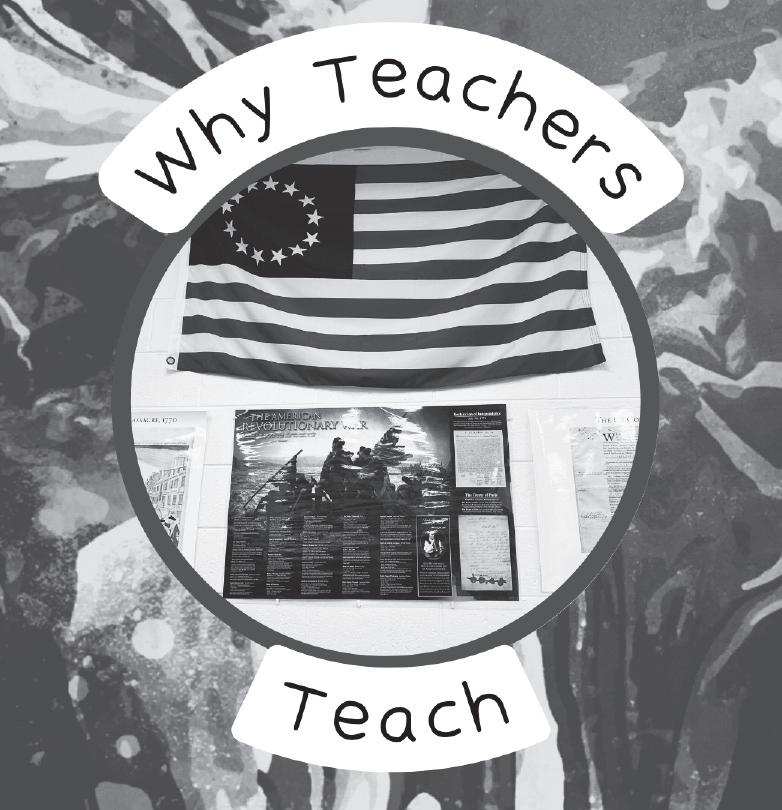
8 minute read
Why Teachers Teach: Mr. Hering
For twelve years of their education, students meet new teachers and with that, new guides on the journey to fi nd themselves: to learn, to uncover their calling, and to let it grow. However, in order to guide others they must fi rst be guided themselves. This leads to the question: Why do teachers teach? It’s certainly not for the money. I interviewed Mr. Hering, the one who inspired this series on why teachers become teachers and their start to change the lives of numerous caterpillars on their way to becoming butterfl ies beyond their lifetimes.
When did you graduate high school? I graduated from high school in 1999.
Advertisement
Did you always know you wanted to be a teacher?
It was roughly halfway through my Senior year of high school when I knew I wanted to be a teacher.
What did you major in in college?
I graduated from Rowan University with a BA in History along with a certifi cation in teaching secondary education social studies. I later went on to get my MA in Educational Instruction and Curriculum.
When was the moment you knew you wanted to be a teacher? Was it one moment or a series of moments that led you here?
There were a number of teachers and coaches that inspired me to become a teacher. However, it all started with two social studies teachers, Mr. Burt and Mr. Becker, having a conversation with me after school one day about teaching. They told me that I had the right personality to be a good teacher and shared reasons with me why they thought I would enjoy teaching as a career. Not too long after, in January of 1999, Mr. Burt died suddenly of a heart attack at the age of 42. It was a huge shock for everyone at Eastern and the loss reshaped many of my life decisions from that point on. That is when I knew I was going to become a History teacher. Mr. Burt’s Betsy Ross Flag still hangs in my classroom (Room 203) as a tribute to him.
How long have you taught at Eastern?
I have been teaching at Eastern for 19 years and was fortunate enough to be hired at Eastern immediately after college.
What have you taught and are teaching now at Eastern?
I have taught United States History I, Sociology, History Through Media, and AP United States Government and Politics. I currently teach United States History I and AP United States Government and Politics.
Why are you a teacher? And what’s your reason for becoming a teacher? Has it changed over time? If so, what’s your why now versus in the past?
My motivation to teach has always been rooted in the positive relationships that I had with teachers and coaches when I was in high school. I like to think that I am carrying their legacies forward while also adding my own personal touch to the teaching profession. They taught me that good teachers love what they teach, teach it with passion, and try as hard as they can to build positive relationships with their students. Even with all of the benefi cial 21st Century technologies to help us make learning more of an interactive experience for students, I will always believe that the best experience for students comes from showing them that what you are teaching matters and treating them with respect and dignity. Every good teacher that I have ever
had or worked alongside of has believed those two things. Now Mr. Hering’s vibrant Betsy Ross Flag sits quietly in his room, encouraging him to teach and students to learn of a history greater than themselves. It serves as a reminder to everyone to carry on the legacy of those who came before them and fi nd their own red, white, and blue. As an homage to Mr. Burt, Mr. Hering hangs the Betsy Ross fl ag in the classroom. Photo by Arianna Morales/Canva.com
Dear Viking: how to embrace yourself and your feelings
By TIANA CYRELSON ‘22 Media Editor
Dear Viking, High School is commonly known as the most exciting years of one’s life. Between classwork, sports, school events, and developing a social life, the four years after middle school are jam-packed and can be hard to navigate. While the school counselor’s doors may stay open, it can be intimidating to walk in and ask for advice. Even with a foot in the door, there are some questions that continue to fall outside the scope of a counselor’s job description. Through an anonymous questionnaire fellow Vikings could ask some of the more diffi cult questions. While I am unable to answer all of them, I will do my best to answer a few of the most important ones.
“What can a person do to help with their confi dence?”
Confi dence is a diffi cult subject. During high school, adolescents are in the midst of fi nding themselves and where they fi t in with others. There’s a constant pressure to appear perfectly put-together. There are two major steps towards increasing confi dence. The fi rst: fake it. While you may not feel it inside, by holding your head high and speaking with conviction, the appearance of confi dence will feel increasingly natural. Square your shoulders, smile, make eye contact, and no one can tell the difference. While faking it is possible, it is not a permanent solution. The second, and most important step to increase confi dence is to fi gure out who you are, and who you want to be. Without knowing who this ideal is, you will be unhappy with the way you present yourself. By fi guring out, and becoming, the person you want to be, the confi dence within will shine through.
“How can I be less depressed?”
Unlike confidence, depression is not something to be faked. High school is a whirlwind of emotions, and without the proper tools to regulate, it can become overwhelming. Unfortunately, there is no cure-all for depression. It is an individual struggle, and what may work for you may be detrimental to another. That being said, there Finding who you are and what works for you is a journey every highschool student takes, but that doesn’t mean you’re alone. Photo by Tiana Cyrelson/Canva.com are a few common strategies. As simple as it may sound, a morning routine can be key to maintaining a healthy mentality. It doesn’t have to mirror the ten-step “Get Ready With Me” video you might’ve seen on a vlogger’s TikTok. This morning routine could be as simple as making your bed, brushing your teeth, and washing your face. By completing simple tasks each morning, it allows the brain to reset and prepare itself for the upcoming day. Keep in mind, it is important to prioritize happiness. This should not come at the expense of necessary tasks such as school, but a mindset focused on happiness as a goal can cause great strides in working towards it. This can manifest itself in many forms, whether it be scheduling a hangout with friends, or setting aside time for hobbies, such as setting aside time to curl up with a good book. This is not a guaranteed instant solution, but by setting a schedule for yourself, and moving happiness up on the list of priorities, it can become achievable.
“How do I get over someone?”
As the season of love approaches, this question involves one of the most common struggles in the world of romance: lingering feelings. When dealing with a breakup, or even unrequited love, it can be diffi cult to put away feelings. Whether it was a breakup, a failed talking stage, or even an unfulfi lled crush, it can be diffi cult to put away those feelings but the recipe is the same: space and time. The world of feelings is complex and diffi cult to navigate. In this world, however, there appears to be one constant: space is necessary. This could be a hard pill to swallow, as it can be disheartening to realize. Cutting off, or even distancing from, someone you fancy can feel nigh impossible, and that isn’t your fault! When you develop a crush, your brain views them as a source of dopamine, or, “the happy chemical.” Like an addict, in order to get over this, you have to quit. By continuously interacting with the person of desire, the dopamine reaction is furthered, and the cycle continues. While a key factor, space is not the only solution. You
Between classwork, need time. It can sports, school events, and developing a social be tempting to try to rush the solution, but this is one life, the four years after that can’t be sped middle school are up. Allow yourself jam-packed and can be the time to truly get over the feelings. hard to navigate. In the meantime, know that it might, and most likely will, hurt. The deprivation of a major source of dopamine is naturally unpleasant, and is compounded on by resurfaced memories you may hold. In the end, love is not exact, nor predictable. It is a rush, it’s exciting, and it’s addicting. But, in the long run, space may be necessary. It is an arduous journey, but it will eventually pay off. Most importantly, the distance does not have to last forever. With enough time, when the feelings are resolved, it’s possible to remain in contact. Like snowfl akes, each love is different and beautiful in its own way. The snow may not last forever, but when it melts, it will re-shape into something new, and the cycle may begin again. While my advice may be in print, that does not guarantee it is “fact.” My opinions are based on my experience and the experiences of those around me. High school is not easy, and a majority of that is due to the process of fi guring out what works for you. While awkward, this can be an exciting process, and is not to be shied away from. These four years are your time to focus on you, putting you in the best place possible to take on the world. Sincerely, Your Fellow Viking








